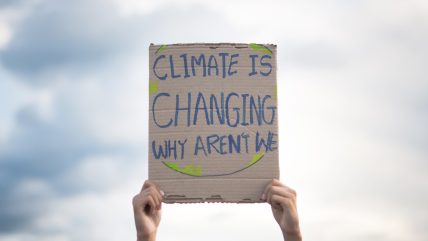
The recent confirmation by the World Meteorological Organization that 2023 was the hottest year on record and the limited commitments to climate action at the COP28 conference that preceded it beg the question of whether society’s current systems can deliver the rapid changes required. What is ‘green capitalism’ and can it tackle the climate crisis?
Few disagree that capitalism, as humanity’s dominant economic system, has played a central role in driving climate change. It remains to be seen if it – or a version of it – can adequately facilitate the shift towards a global green economy.
Josh Pitman, managing director of sustainable packaging firm Priory Direct, tells Energy Monitor: “I believe capitalism has caused the climate crisis, but I don’t think that makes capitalism the enemy, and to argue that would be counterproductive.”
Similarly, Dr Ana Nacvalovaite, a research fellow at the University of Oxford’s Kellogg’s Centre for Mutual and Co-Owned Business, views capitalism as an agile system that could yet accommodate humanity’s need for change.
“Capitalism is responsive to consumer behaviour,” she explains. “There is truth in saying that the industrial and economic activities characteristic of capitalist systems have contributed to the climate emergency. However, capitalism is dynamic, adaptable, and capable of evolving with changing societal values and technological advancements.”
Green capitalism defined
With this in mind, the concept of ‘green capitalism’ has been variously touted, including recently by Bloomberg reporter Akshat Rathi, who argues that the climate crisis was caused not by “capitalism but the corruption of capitalism” and that it is “cheaper to save the world than destroy it”.
Proponents of the concept believe that tools, mechanisms and regulations can be enacted to deliver a form of capitalism that is consistent with – and, indeed, can deliver – a sustainable global future.
Explaining the two core principles of green capitalism to Wired, Adrienne Buller, who criticises the concept in her book The Value of a Whale: On the Illusions of Green Capitalism, wrote: “The first is that it’s an attempt to resolve the climate crisis in a way that minimizes disruption to our existing ways of organizing the economy, to existing distributions of wealth and power.
“The second tenet is pursuing decarbonization in a way that makes sure that there are still opportunities for profit-making and rent extraction in that decarbonized future. In contrast to, for instance, moving away from private car ownership to mass transit as a climate solution, the green capitalist framework is more about making sure we can transition to electric vehicles when we’re moving away from fossil-fuel-driven cars so that private companies can keep profiting.”
Green capitalism in essence is based upon the premise that profit and environmental sustainability can be reconciled.
Green legislation and business responsibility
For this to be feasible, businesses must be governed by rules that are aimed at facilitating sustainability, such as the EU’s Corporate Sustainability Reporting Directive.
Pitman says: “Capitalism got us into this mess, but we’re now so embedded in this productive model that we must use it as the ultimate driver of progress towards sustainability. If we legislate businesses to make positive ESG outcomes and natural capital a significant part of their bottom line then I believe business and capital could be the main driving force innovating our way to a more sustainable future.
“We shouldn’t look for bad people, but bad systems. Our current capitalist system offers a lot of opportunities for productivity and innovation and has huge momentum. Align this momentum with positive outcomes for the planet, and watch us progress.”
Indeed, Rachael Delacour, CEO and founder of climate analytics firm Sweep, argues that companies that do not begin to adjust their business practices will start to face regulatory fines, reputational damage and therefore loss of customers over the next ten years.
She adds, however, that a key challenge for green capitalism is operating in a fragmented world, with different regions having varying regulations and emission standards.
Renaud Heyd, chief financial officer in the UK and Ireland at software giant SAP, believes that it is not just regulations that will affect change, but pressure from the likes of customers and suppliers.
“From my own conversations with leaders, there’s a general feeling that this train has left the station,” he says. “Environmental action is financially good for business.”
Climate finance
Despite these drivers of change, there remains a need for significant financing of green initiatives.
Bart Wesselink, chief financial and risk officer at environmental commodities trader STX Group, explains: “Corporate action and climate finance play a pivotal role in steering the global energy transition towards sustainability.”
He points to climate finance trends such as green bonds and climate risk insurance that have been mobilising private sector capital for environmentally friendly initiatives, but Wesselink is also clear that funding is currently falling short.
“Total pledges at COP28 equated to $85bn, which was well short of the $3-6trn annually that the IMF said will be needed until 2050 to meet the Paris Agreement targets,” he comments.
“A huge funding gap from global banks is evident, and though a huge amount of work is going on to galvanise action from banks at an international level, it falls to the private sector to close the gap.”
Similarly, Wesselink highlights that, despite some positive trends in climate finance there are severe challenges in the equitable distribution of funds across the globe: “Developing nations face hurdles in accessing climate finance, requiring global cooperation to address the disparities.”



